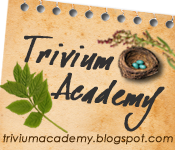I'm copying over what I've post at the WTM Boards lately regarding my concerns about language arts. Sometimes in a conversation with another, I find more help with my thinking process. I'm copying it here so I can refer back to it instead of trying to find a needle in a haystack at the boards.
First post: I'm a little confused- question about delayed grammar, copywork and dictation.
Dd7 is in 2nd grade. I stopped using FLL b/c I decided to wait for grammar but dd liked the lessons and I'm confused now. I'm reassessing where we are and I know I want to build her reading/writing skills but I'm unsure how to go about it.Second Post: Regarding grammar, final thoughts.
I've been using our history copywork for informal grammar lessons. For example:
Charlemagne was known as the "Emperor of the Romans" because his empire grew from his valiant efforts. He started schools, built new roads and bridges, and fought wars to build his empire. Charlemagne also desired everyone to become a Christian."
Highlighted for informal grammar:
- special title in quotation marks
- capitalization of proper nouns
- vocabulary word lookup: valiant
- comma useage in listing items
Another example:
"Since tonight the wind is high
The sea's white mane a fury
I need not fear the hordes of Hell
Coursing the Irish Channel."
-On the Viking Raids, Anonymous
Highlight for informal grammar:
- capitalization of each first word in a poem
- capitalization of proper nouns
- vocabulary word lookup: fury
- quotation usage when using an excerpt
Of course it's not systematic and I guess that is what is worrying me, whether I'm providing enough for her at this stage by doing it this way. This way is easier for me to blend it into our day without making grammar a subject on its own. I plan to use Junior Analytical Grammar in 4th grade and we're using Writing Tales 1 next year in 3rd.
Dictation though is supposed to enforce proper sentence formation, spelling and punctuation, isn't it? So if I'm not formally, systematically teaching these items, how do I approach dictation? Or do I?
If jumping back into FLL will benefit dd more, I'll do it. I just need help figuring out what would be best to do.
At first I was starting to get confused by all the different responses to my question b/c I wasn't trying to do anything the Beechick, Bluedorn, WTM, FLL way. I was just trying to create a natural learning situation instead of feeling like a robot reading a scripted lesson.In response to another hsler on second post:
It is so hard to believe in the value of formal grammar at 2nd grade outside of memorization. Getting her to pay attention to a read-aloud or to think about what she's going to say BEFORE she says it! Lol.
Yesterday I got out FLL and Ruth Beechick's A Strong Start in Language. This is what I came up with but I haven't finalized yet.
- Read story/picture narrations from FLL
- Use the grade level guidelines from Strong Start
- Use writing prompts like from Spelling Workout to have dd write each day, using a "topic" jar.
- teach punctuation/capitalization, I don't see a reason to change what we're doing already
- continue using higher vocabulary words with dd with dictionary skills
- continue using Spelling Workout
- continue memorizing poetry
- continue book reports
What I need to do is find a system of doing all of this and make it happen. The reason I'm questioning what I'm doing is b/c we've taken 2 months off from everything but reading. I feel very convicted to get dd writing even just a sentence of her own a day.
I'm going to look again at Writing Tales and see if dictation is covered. I don't think we're there yet but of course I see dictation as something to do after you've provided a child with punctuation/capitalization instruction. I want to set her up to succeed or at least be as successful as she's able. I'm not in a rush, if we neglect to learn something, we'll realize it later and learn it then.
I have a hard time believing that grammar needs to be taught from 1-12. Even with teaching French, we're learning more vocabulary than grammar in the younger ages. Speaking is much more important.
I did get a little confused yesterday but I went back like someone suggested and realized how I came to the decision of delayed grammar. I feel much better now.
The book reports we are doing are easy-peasy. It's Evan-Moor's How To Report on Books Grades 1-2. Veritas Press uses it and OhElizabeth suggested it when I asked if there was a way to gently introduce literary elements.
From the books she reads in a week, I pick one that will fit the book report theme. An example:
Describe the Main Character
Title:
Author:
Illustrator:
Main Character:
Circle the words that tell about the character:
[list of adjectives]
There are book suggestions to read and teaching tips.
````````````````````````````````````````````
Sometimes she needs to draw something or write a sentence. I think it's great and helps accomplish talking about literary elements at her level.
One thing I am going to be focusing more on is to talk with her about the sequence of a story we read. I haven't been utilizing our read alouds as much as I could and getting all that we can out of them at her stage. We read 2-3 chapters of a longer read aloud at a time and I make sure to summarize the story that we previously read before we read a new chapter and I talk with her about predictions and any moral dilemmas I feel are appropriate to talk about but that's it.
I'm feeling the need to beef it up a little more, talk about the sequence of events, cause and effect, etc. This can be done simply with even a short picture book. Writing Tales has inspired me by the way Amy incorporated games and activities that really help teach. Writing down on index cards the sequence of events of a story in sentences and having a child put them in order is not hard to do.
I'm also getting Teaching the Classics as a part of 3rd grade's curriculum to help me.
The more experience I gain, the more I realize it truly is quality, not quantity in just about everything we do. If we read one book and talk about the elements instead of trying to just plow through 3 books in the same amount of time- which is better?
If I spend more time teaching a concept than throwing a multitude of review at her for practice for a short teaching session, isn't that better?
I'm at the point that
1. I realized comparing us to public school or other homeschoolers really doesn't help. I look for inspiration instead, I'll steal your ideas in a heartbeat if I think it'll work for us! :)
2. Teaching takes time and effort, finding an efficient way to teach helps me be more effective in a shorter time.
3. It's really not a race, we WILL learn and relearn just about everything we're doing. It's why I chose classical education over other models, building blocks of the trivium is what sold me. I want a spiral education for my children that will result in mastery, the main goal of each subject we take on is mastery eventually.
4. To trust myself more- I have a great instinct when it comes to my kids, I know when an approach is wrong or something is awry. I know when *I'm* not being effective. I have developed a strong sense of what will work for me as a teacher and what will work for dd as a learner and it changes all the time. The last two years I've been pulled by peer pressure, enthusiasm of others' goals & accomplishments and I'm finally getting to a place of being okay, "we won't do that or at least not in that way".
Is there anything better than getting the help you need, when you need it? I have been blessed greatly by other homeschoolers online and it has been a saving grace. From the bottom of my heart, thank you.




























3 comments:
G'mornin' Trivium :-)
I found your link on my sitemeter, and decided to drop by. I'm not one who visits the blog world much, but your post caught my eye.
I can tell you what conclusion I have come to that has helped me a lot with this type of dilemma. Perhaps something here will give you some insight:
For some subject areas, I prefer to get a textbook and just keep following it each year. Math is good for this. Other subjects are too much of an octopus to do this--such as composition and grammar. I do like to choose a solid textbook at some point and gleam from it all that we can learn, but then I move on to another and another. We take what benefits us and then we look to find the next step for what would suit us.
The last addition would be more of a unit study approach added to those textbooks. For example, if you want to do the dictation each day along with the questions you listed, that is really great! You should stick with it long enough to get its full benefit, but when you tire of it or when you flounder, then it is time to move into another unit of study.
Evaluate the needs, list them and collect ides and materials, and then work your way through them one unit at a time. I can think of units we have done on the paragraph, summarizing, outlining, copying/dictation, the topic sentence, identifying clauses and phrases in sentences, etc. My kids, of course are much older than yours, so we've covered a lot of topics over the years. Sometimes I choose materials that will accomplish the task I see missing in a child's work--such as using Editor in Chief for my youngest in order to clean up his written work.
Relax--enjoy. Tempus fugit.
:-) Jean
I read your blog because I too have a ds in 2nd grade and language arts is my homeschool weakness. I debate the same things you do and really wish there was some standard of where they should be at what grade. I looked at writing tales because of your ponderings here and it really looks good. So, thanks for putting your thoughts about your homeschool on line for all of us to read. It's been very helpful!
Beth
Great ideas about Lang. Arts. My youngest "student" is a 3rd grader and we did do v.e.r.y simple dictation in 2nd grade, but maybe a handful of times. It's hard to fit everything in and it's so discouraging sometimes when you feel like you can't. But, like you said, this is why we educate classically - they'll get it all again in the next go-round. I'm going to check out the Beechick book on Lang. - don't have that one, but I think we need it! ;-) Blessings!
Post a Comment